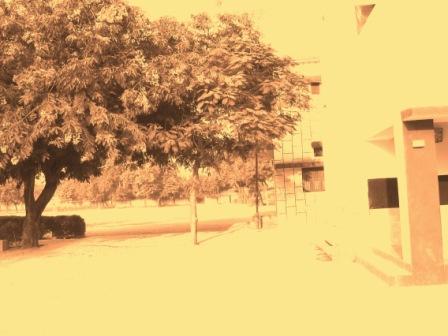Jalwa Baqadr-e-Zarf-e-Nazar
[By Jigar Moradabadi]
Jalwa baqadr-e-zarf-e-nazar dekhte rahe
Kya dekhte hum unko magar dekhte rahe
Apna hi aks pesh-e-nazar dekhte rahe
Aaina ru-ba-ru tha jidhar dekhte rahe
Unki hareem-e-naaz kahaan aur hum kahaan
Naqsh-o-nigaar-e-parda-e-dar dekhte rahe
Aisi bhi kuch firaaq ki raatein guzar gayin
Jaise unhi ko pesh-e-nazar dekhte rahe
Har lehza shaan-e-husn badalti rahi Jigar
Har aan hum jahaan-e-digar dekhte rahe
---
One of my favorites from Jigar, grows on you slowly but surely...is open to more than one interpretation. It reads so well as poetry sung to an earthly beloved - yet Jigar's verses often seem to imply Sufi angles and the meanings could apply to the Spiritual 'beloved'. In this ghazal in particular, the two layers of meaning flow through so seamlessly. Listen to it rendered by Abida Parveen here.
Subscribe to:
Post Comments (Atom)






20 comments:
Apna hi aks pesh-e-nazar dekhte rahe
Aaina ru-ba-ru tha jidhar dekhte rahe
These lines influenced me the most...
Waiting for the translation!
"Kya dekhte hum unko magar dekhte rahe"- Woww! What an expression. Wonder how the effect of it would be translated in Engish. Waiting!
wow! u really are into GOOD poetry. Thats a rarity these days.
tap: those lines are certainly very reflective...have tried to preserve that aspect throughout the translation
vik: it has been said that a poet's ability to 'wow' his audience comes often from being able to use the particulars of the language in a way that cannot be translated. that's what makes these translations tough!
how do we know: welcome and thanks for the thoughts...trying to preserve my own tastes and share them with the world at large too...
I took that line in a different sense. A rough translation of that would be: "Who am I to look at her (or, how entitled am I to look at her), yet I stared.". But as you say, poetry can have varying interpretations. In this particular case, it's all about where we like to have a pause in the sentence.
The thing you mentioned about a poet's ability is so true! I couldn't agree more.
one of my favourites from Jigar too :)
vik: i like your translation. I should have kept that as well.
illusionist: i think jigar is dominating this space so much because i cant think of anything by him that i dont like...there's something about his content and style that strikes...
Greetings of Peace!
Can i request a translation of this beautiful song pls?
Waah, aapne kuch accha aur behtareen padha diya
Tapasya... this is the translation..
Apna hi Aqs pesh-e nazar dekhte rahe...
In this world I only saw reflection of my inner self in people (good or bad)
Aaina ru-ba-ru ttha jidhar dekhte rahe... It was as if there are mirrors all around me...
the poet tries to emphasize that we see world as we are..
this is my two cents..poetry can have so many colours and depths..its upto you where to stop and ponder...
I dont know why but i think of Muhammad (s.a.w) while listening to this particularly the verses where the poet says; Un ki hareem-e-naz kahan aur hum kahan, naqsho nigar parda'i dar dekhtay rahay.
I feel myself sitting outside his Roza and watching the grills around hhs place of rest.
@ Tapasya
I think this verse means (to me) at least,
That I was shown the way back to myself every time I tried to find solace in anything or anyone...
As if I was always surrounded by mirros (not people) in which I could only see myself, just myself and nobody else..
Very true it seems that jigar saheb had in mind the imagination of roza of our beloved messenger, staring at it what one sees is curtains and golden grills with intricate design in them,very true interpretation of this verse.when a poet of jiger's calibre writes it has a very deep meaning which is out of reach of a layman's thoughts only a person who is immersed in Sufism will be able make sense of it.
also please listen the version of farid ayaaz and abu muhammad.
y'all will love that!
Is there anyone who can tell me about the that first line , before the starting of this ghazal ,Abida g used as aalap. In original song .of album RASQ E BISMIL.
Its myself where ever I look I just found myself, the other person standing infront of me is also me. actually this lines are connecting with sipirtuialty
🙏😇
The vision of our beloved Prophet Muhammad (PBUH) and the divine presence of our Glorious Creator, Allah (SWT), in a dream is the highest of blessings, a treasure beyond all treasures. This profound privilege is bestowed only upon the most fortunate souls, by Allah’s (SWT) exclusive permission.
Our worldly, sinful eyes are incapable of beholding such sacred sights; it is only through Allah's (SWT) grace that He grants this unique access to whom He wills. He alone opens the portals that lead to the feet of His beloved Prophet (PBUH), allowing those chosen to walk alongside him on the paths he walked during night of miraj.
C. Imran
@ Tapasya:
Apna hi aks pesh-e-nazar dekhte rahe
Aaina ru-ba-ru tha jidhar dekhte rahe
When your heart is cleansed through genuine repentance, it becomes like a clear mirror, allowing you to see both your true self and the reflection of your beloved.
Post a Comment